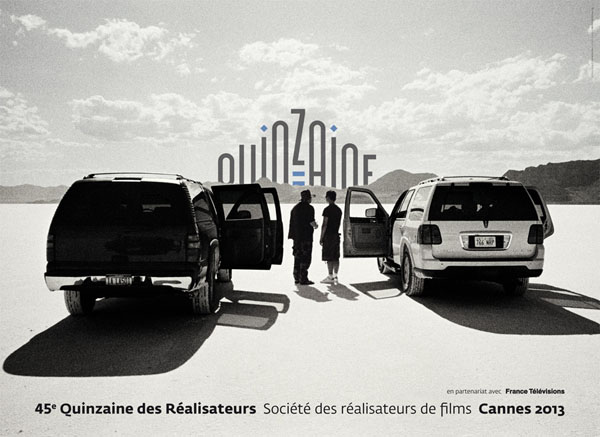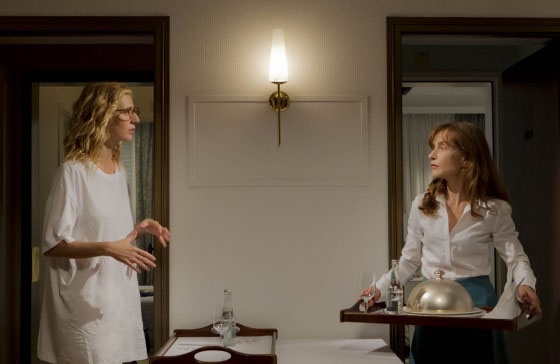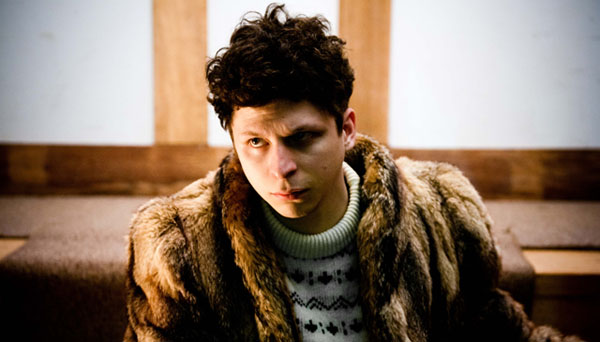On Thursday, Edouard Waintrop, artistic director of the Quinzaine des Réalisateurs, the Directors’ Fortnight, announced that Ari Folman’s The Congress, an adaptation of Stanislaw Lem’s 1971 novel The Futurological Congress would open this year’s edition, the 45th. The synopsis: “Robin Wright (Robin Wright) receives an offer from Miramount to be scanned. In this way, her alias can be freely exploited in all films the Hollywood major decides to produce, even the most downmarket ones, the ones she has turned down until now. For 20 years she disappears to return as guest of honor at the Miramount-Nagasaki Convention in a transformed world of fantastical appearances.”
Today, we have the full lineup. In Variety, Elsa Keslassy notes that it’s got “Waintrop’s stamp all over it. When Waintrop took over Directors’ Fortnight in 2012, he spoke to Variety about his desire to raise the sidebar’s profile and cast a wider net, with more genre films, crossover fare and American indies represented. ‘In 2012, we ended up with a strong selection of films, but I felt that we needed a larger U.S. presence. This year, we’re right where we need to be,’ he said.”
Sélection 2013 par Edouard Waintrop from Quinzaine des Réalisateurs on Vimeo.
FEATURES
Kaveh Bakhtiari’s L’escale. Swiss Films describes the documentary: “Seeking their dream of a better life and freedom, people from all walks of life make the radical decision to leave everything behind and emigrate from Iran. They cross the exceedingly dangerous border into Turkey, risk their lives on board refugee boats heading for Greece, and finally arrive in Athens. Mohsen is the film director’s cousin and one of the emigrants. The film begins with his arrival in Athens. After being conned by his smuggler, Mohsen finds shelter with Amir, who runs a ‘boarding house’ for illegal immigrants. Amir’s place has evolved into a sort of headquarters, as it were, where everyone is mapping out plans to continue their journey.”
Clio Barnard’s The Selfish Giant. It’s “a contemporary fable about 14-year-old Arbor (Conner Chapman) and his best friend Swifty (Shaun Thomas),” noted the BFI in October. “Excluded from school and outsiders in their own community, the boys meet Kitten (Sean Gilder), a local scrapman, and begin collecting scrap metal for him using a horse and cart. Swifty has a natural gift with horses and Arbor has a business brain and a way with words–they make a good team. But when Arbor begins to emulate Kitten by becoming greedy and exploitative, tensions build, leading to a tragic event which transforms them all irrevocably. The Selfish Giant is writer/director Clio Barnard’s second film, following on from The Arbor, her feature-length documentary film about Bradford playwright Andrea Dunbar.”
Serge Bozon‘s Tip Top. From Ioncinema: “Based on the novel by British author Bill James, Tip Top follows two female police inspectors from the police’s complaints and discipline branch as they investigate the death of an informant at a provincial police station. While they get along fine as partners, their private lives are very different. While man-hungry Sally (Sandrine Kiberlain) and the spousal abuser Esther (Isabelle Huppert) investigate, they are spied upon by reporting officer, Robert (Francois Damiens).”
Anthony Chen’s Iloilo. It’s “about the relationship between a Singapore family and their newly arrived Filipino maid in the midst of the 1997 Asian financial crisis,” reports the Straits Times. “Starring Yeo Yann Yann, Chen Tianwen and Angeli Bayani, the film is inspired by Anthony Chen’s memories of being brought up by a maid who comes from Iloilo, a province south of Manila.”
Basil Da Cunha’s Apres la nuit. From artfilm.ch: “Life as a dealer in the Creole shantytown of Lisbon is certainly not relaxing. But since Sombra’s release from prison, it has been infernal. What with the debts he can’t manage to collect, a capricious iguana, an invasive little neighbor, and a doubting wholesaler, he begins to think it would have been better to stay behind the scenes.”
Thierry De Peretti’s Les Apaches. Set in Corsica and “inspired by the real-life murder of a teenager by his friends on the island,” according to Melanie Goodfellow in Screen.
Guillaume Gallienne’s Me Myself and Mum. From the Film Catalogue: “My earliest memory of my mother dates from when I was four or five: she called my two brothers and me to the table saying, ‘Boys, Guillaume, dinner!’ and the last time I spoke to her on the phone two days ago, she hung up saying, ‘Take care, my big girl.’ And, well, between the two there were quite a few misunderstandings.” In addition to an heterosexual coming-out, the movie tells the story of an actor who, from the “bourgeoisie” to the stage, has never stopped loving women, maybe a little too much… With Guillaume Gallienne, Françoise Fabian, and Diane Kruger.
Before moving on to the new film by Alejandro Jodorowsky, let’s note that Frank Pavich’s Jodorowsky’s Dune will be screening as well, the doc on Jodorowsky’s 1974 “attempt to create a big-screen adaptation of Frank Herbert’s seminal science fiction novel, Dune.” From the first pitch for the doc: “While the ambitious production collapsed after two years, Jodorowsky’s team of then relatively unknown concept artists continued exploring the themes and styles started on the project and ended up changing modern science fiction forever: H.R. Giger went on to Ridley Scott’s masterpiece Alien, Dan O’Bannon wrote Alien and Total Recall, Jean ‘Moebius’ Giraud created artwork and futuristic worlds for The Empire Strikes Back, Tron, and The Fifth Element, and Chris Foss would go on to work on Alien and Superman.”
Now then. Alejandro Jodorowsky’s The Dance of Reality. From Ioncinema: “Jodorowsky has published 23 novels, but it’s his autobiography that the 84 year-old Chilean director has decided to film, set (naturally) in his hometown of Tocopilia—breaking a two decades plus hiatus (the chances of us ever seeing King Shot—by all indications an actual Jodorowsky picture—have become miniscule to non-existent). Jodorowsky’s son Adan will play the role of his father in the film, so it appears to be more fiction than documentary at the moment.” The Wikipedia entry notes that “Jodorowsky has stated that he wants to ‘lose money with the film.’ It has been described as being ‘surrealistic.'”
Anurag Kashyap’s Ugly. Dear Cinema reminds us that Kashyap’s two-part Gangs of Wasseypur screened in the Quinzaine last year and that Bombay Talkies, “a portmanteau feature, which has a segment directed by Anurag Kashyap will have a gala screening at Cannes to mark the 100 years of Indian cinema.” Kashyap on Ugly: “It’s a simple kidnap drama but it deals with relationships, patriarchal system, how men look at women, domestic violence and many more things. It’s a very personal drama in the shape of a thriller.”
Erik Matti’s On the Job. Todd Brown at Twitch: “The story was triggered by an actual political scandal in which word got out that politicians were colluding with mobsters and corrupt prison officials to release prisoners on day passes and using them as hitmen—the specific story in the Philippines involved a politician using a prison hitman to take out a political rival in the lead up to an election, similar stories have since emerged from Mexico as well—with Matti aiming to turn that material into a character driven, noir inflected action picture.”
Jim Mickle’s We Are What We Are. At the top of his review for Indiewire, Eric Kohn notes that this is “Mickle’s loose remake of Jorge Michel Grau’s 2009 Mexican cannibal tale,” and it “brings the filmmaker’s distinct blend of the elegant and the macabre to its ultimate realization. Outdoing the original by a long shot, Mickle’s slow-burn take on the story is poetic, creepy and, finally, satisfyingly gross.”
Yolande Moreau’s Henri. In Moreau’s followup to When the Sea Rises, a hit in 2004, Henri is “a fifty-something pigeon fancier who owns a popular brasserie and doesn’t have many more expectations in life,” reported Fabien Lemercier in Cineuropa last year. “When his wife suddenly dies, a young disabled girl comes to help him at the brasserie. Her name is Rosette. Little by little they form a tender and affectionate relationship, through which each of them, having both suffered for too long, find a new meaning to life.”
Raphael Nadjari’s Above the Hill. Keslassy notes that it’s “centered on a lonely and neurotic divorced man who seeks his estranged father’s help.” And in the Hollywood Reporter, Rhonda Richford adds that this “will be the Israeli-French filmmaker’s return to Cannes after a 14-year absence; his 1999 film The Shade was an official selection for Un Certain Regard.”
Un voyageur english subtitles from TheFactory on Vimeo.
Marcel Ophuls’s Un voyageur. As you can see in the trailer above, this is a documentary self-portrait with, evidently, particular emphasis put on growing up as the son of Max Ophuls.
Antonin Peretjako’s La Fille du 14 juillet. As far as I can tell, this will be about a group of friends who go on a road trip from Paris to the sea, in part to take the mind of one Hector off a girl he met at the Louvre on July 14 and has been obsessed with ever since. Shellac has photos.
Ruairi Robinson’s Last Day on Mars. At Screen, Sarah Cooper has a synopsis and an interview with Robinson and producer Andrea Cornwell: “On one of the first manned missions to Mars, the crew of the Aurora discover evidence of life on Mars… and it’s not friendly.” With Liev Schreiber and Romola Garai. Robinson: “I’m a big paranoia sci fi fan, movies like The Sting and Invasion of the Body Snatchers. It was a nice chance to do a kind of 70s paranoia movie but with modern toys. There hasn’t really been that kind of claustrophobic, characters at each others throats, densely packed movie in a while. I haven’t really seen it since the first Alien.”
Marcela Said’s The Summer of the Flying Fish. From John Hopewell in Variety: “An allegory of Chile’s unchanging bourgeoisie, Fish is the fiction feature debut of Marcela Said, whose third documentary, The Young Butler, played Berlin’s 2011 Forum.”
Jeremy Saulnier’s Blue Ruin. From the Kickstarter campaign: “It’s about a beach bum, whose quiet life is upended by dreadful news. He sets off for his childhood home to carry out an act of vengeance but proves an inept assassin and finds himself in a brutal fight to protect his estranged family.”
Sebastían Silva’s Magic Magic. When it premiered at Sundance in January, Sam Adams, dispatching to the AV Club, noted that it seemed odd for the programmers “to separate by five days the premieres of the festival’s two Sebastían Silva/Michael Cera joints: the loopy drug odyssey Crystal Fairy, which screened on opening night, and Magic Magic (B), in which Juno Temple has a schizophrenic episode amid some of the most self-centered and incapable people on earth. But giving each film breathing room turned out to be a wise decision, since Magic Magic is less the Smoke to Crystal Fairy‘s Blue in the Face than its dark, warped mirror image. Very nearly the inverse of Gaby Hoffmann’s nature sprite, Temple’s anxious Californian has been dispatched to Chile to spend some time with cousin Emily Browning, presumably as part of some ill-thought scheme to give her mind a rest. Along with Browning’s Chilean boyfriend and short-tempered Catalina Sandino Moreno, who finds Temple an instant drag, the cousins set off for a trip to a remote island where the hairline cracks in Temple’s sanity widen to yawning chasms.”
“Cera may not be the protagonist, but he’s certainly the pic’s most interesting personality as Brink, an attention-seeking American in Chile who obnoxiously flaunts his grasp of the local language and customs in the face of newcomers,” wrote Variety‘s Peter Debruge. “Meticulously acted, gorgeously shot and hilariously insightful about the strange, inarticulable ways people can get on one another’s nerves, this psychological thriller takes its premise to surprising, darkly comic extremes.”
More from Nicholas Bell (Ioncinema), Sebastian Doggart (Guardian, 3/5), Tim Grierson (Screen), Eric Kohn (Indiewire), and Amanda Mae Meyncke (Film.com). For the Los Angeles Times, Mark Olsen spoke with Silva, Temple, and Browning.
Meantime, at Indiewire, Erin Whitney‘s just posted Michael Cera’s directorial debut (19″33″): “Described as a dramatic comedy, and specifically not a parody or sketch, Brazzaville Teen-Ager follows a son on a desperate and awkward journey to help his sick and distant father. The short also stars Charles Grodin, Jack O’Connell (Skins), and, oddly enough, R&B singer Kelis.”
SHORTS
Radu Jude’s O umbra de nor.
Yann Le Quellec’s Le Quepa sur la vilni!
Dénes Nagy’s Lágy Eső.
Oscar Ruiz Navia’s Solecito.
João Nicolau’s Gambozinos.
André Novais Oliveira’s Pouco mais de um mês.
Lynne Ramsay’s Swimmer.
Marie-Elsa Sgualdo’s Man kann nicht auf einmal alles tun, aber man kann auf einmal alles lassen.
Eduardo Williams’s Que je tombe tout le temps.
For news and tips throughout the day every day, follow @KeyframeDaily on Twitter and/or the RSS feed. Get Keyframe Daily in your inbox by signing in at fandor.com/daily.






